Text
うっかり
carelessly; thoughtlessly; inadvertently
うっかり間違いをおかした。
うっかり まちがい を おかした。
I made a careless mistake.

55 notes
·
View notes
Photo




A very special letter! ✨
Chibird store | Positive pin club | Instagram
4K notes
·
View notes
Photo
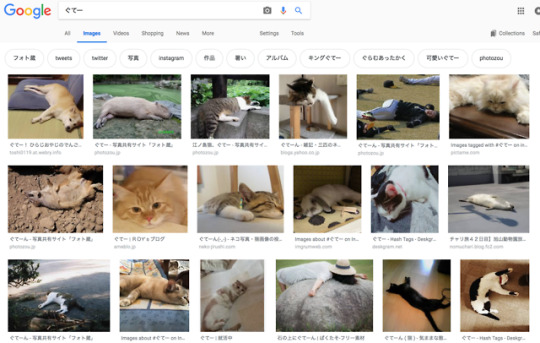
When you don’t know what the word means but Google Images has you covered
ぐてー (I guess it means ‘sprawled out’, mostly for animals)
244 notes
·
View notes
Text
Company in Japanese

会社 かいしゃ company
株式会社 かぶしきがいしゃ corporation
有限会社 ゆうげんかいしゃ limited company
大企業 だいきぎょう large enterprise
中小企業 ちゅうしょうきぎょう small- & medium-sized businesses
外資系 がいしけい foreign-affiliated
設立 せつりつ establishment, incorporation (of a business)
合併 がっぺい merger
倒産 とうさん bankruptcy
90 notes
·
View notes
Photo
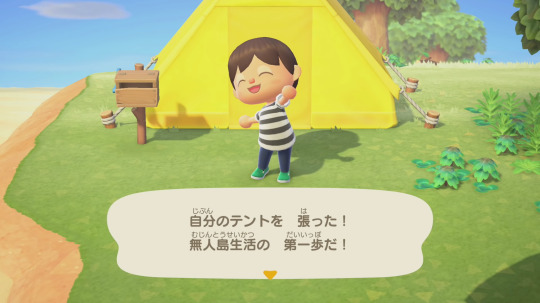
こんばんは、皆さん
sorry for going dark for a few weeks after posting the first part of the animal crossing series, the next part is taking awhile, and I also had to break it down into smaller chunks again because there is SO MUCH vocab.
anyway, I figured I'd fill the space with a small informative post. Here's a screenshot I found while I was gathering vocab for the next part. I figured I'd break it down for you. Consider it a bite sized lesson!
So what's great about animal crossing games in Japanese is they add appropriately used spaces in between sections in the sentence, it makes it easier to read. Let's look at each part one at a time..
自分のテントを
自分(じぶん)is a word for oneself, and since の is after it, it's possessive. Meaning "one's own." テント means, "tent" in English, and the particle を is just object particle used before the verb at the end of the sentence, so it means that something happened to the character's tent... what happened?
張った!
張った(はった)is the past tense for 張る(はる)which means to pitch or set up a tent! So the first sentence means "I set up my tent!"
Here's a fun word... 無人島生活(むじんとうせいかつ)if you read the registration vocab list I put up for acnh, you would know 無人島 means "deserted island." we've previously seen it used in the in-game phrase "deserted island getaway package" but here we see it with the word 生活 which mean's one's life or daily living.
So 無人島生活 is best translated to "Deserted Island Life"
We see the possessive particle, の again, but in this case it is connecting two nouns together, the noun it's connected to is 第一歩(だいいっぽ)which means "first steps." After that, we have だ which is a casual version of です, basically saying it's the end of the sentence.
(It just occured to me how much I really hope that people know hiragana and what です is if they're reading my posts xD)
Anyway! Now that we have the breakdown, what does the screenshot translate into?
自分のテントを張った!無人島生活の第一歩だ!
or in other words
"I set up my tent! That's the first step towards my deserted island life!"
Hope that is helpful! It was a very winded explanation for simply two sentences xD but that's the complexity of learning a second language.
- Nano
3 notes
·
View notes
Text
ACNH Japanese Vocab - Registration
* The following are vocab I collected from the opening scene of ACNH, before you arrive to your island. I chose words that I didn't know, and sometimes, words I did know but thought would be important to put in. They also include some in-game terms, such as company/shop names and character names. I hope this is helpful for anyone playing the game in Japanese/wanting to prepare to play the game in Japanese.

むじんとういじゅうパッケージ 無人島移住パッケージ Deserted Island Getaway Package
むじんとう 無人島 (n) deserted island / unpopulated island
いじゅう 移住 (n, suru, no-adj) immigration
パッケージ (n, suru) package
てつづき 手続き (n, suru) procedure / (legal) process
つとめる 務める (ru-verb, vt) to serve (as)
たぬきかいはつ たぬき開発 Nook Inc.
かいはつ 開発 (n, no-adj, suru) development
ともに 共に (adv) together, jointly
わたる 渡る (u-verb, vi) to cross over, to go across
くらし 暮らし (n, n-suf) life, living, livelihood, life circumstances
すえながく 末長く (adv) for many years to come
じゅんび 準備 (n, suru) preparation, setup, arrangments
すすめる 進める (ru-verb, vt) to advance
もうしこみ 申込 (n) application
かくにん 確認 (n, suru) confirmation
よろしい (i-adj) good, ok, all right
みだしなみ 身だしなみ (n) personal appearance
ととのえる 整える (ru-verb, vt) to arrange
あんしん 安心 (na-adj, n, suru) peace of mind, relax
けってい 決定 (n, suru) decision
とうろく 登録 (n, suru) registration
しうだん 相談 (n, suru) discussion
しま 島 (n) island
きめる 決める (ru, vt) to decide
とうしゃ 当社 (n) this company
とくちょう 特徴 (n) feature, characteristic
しき 四季 (n) four seasons
ながれる 流れる (ru-verb, vi) to pass (through)
*NOTE : in this context, 流れる means "to pass through the seasons", this is a complicated verb to translate, please look into it's multiple meanings
きせつ 季節 (n, no-adj) season
へんか 変化 (n, suru) change
ことなる 異なる (u-verb, vi) to vary, to differ
きたはんきゅう 北半球 (n) northern hemisphere
みなみはんきゅう 南半球 (n) southern hemisphere
しんせいかつ 新生活 (n) new life
スムーズ (na-adj) smooth
なれしたしむ 慣れ親しむ (u-verb) to become familiar with
きこう 気候 (n) climate
かんきょう 環境 (n, no-adj) environment
オススメ (n, suru, no-adj) recommendation (also お勧め)
おすまい お住まい (n) house, residence
ばしょ 場所 (n) place, location
じっさい 実際 (no-adj, adv, n) practicality, practical
えらぶ 選ぶ (ru-verb, vt) to choose
かしこまる (u-verb, vi) to obey respectfully
ちず 地図 (n) map
ぶたい 舞台 (n) scene or setting
ねぶくろ 寝袋 (n) sleeping bag
あかり 灯り (n) lamp, light
しょくりょう 食料 (n) food
ヒマつぶし (n, suru) to kill time, waste of time, killing time
ていばん 定番 (n, no-adj) standard, routine, regular, basic
きょうみほんい 興味本位 (na-adj, no-adj) out of curiosity
ごあんない ご案内 (n) acquaintance, knowledge
かんりょう 完了 (n, suru, no-adj) completion
すみやか (na-adj) speedy
しゅっぱつ 出発 (n, suru) departure
Hope that is helpful! I plan on making more of these in the future, so hopefully this will be a good resource for a long time to come!
Also, if anyone is confused on the dictionary abbreviations, I plan on compiling their meanings and alternatives in a post another time!
I am keeping a spreadsheet of the words in attempt to prevent unintentional repeats, but that also means there will be new words each time I make one, so try and keep up if you're interested (haha, sorry)
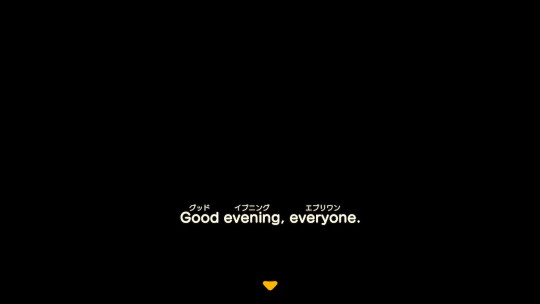
There's a lot of cool hidden things in the Japanese version of the game, like the sweet message from Timmy and Tommy I showed earlier, and the fact if you're in the northern hemisphere but not in Japan, they will translate it that area's language when you're flying in for the first time. Very wholesome stuff.
Point is, if you want to play in Japanese and feel brave enough, please do! Or just study from my vocab words... that's okay too I guess ; ;
Until then, take it easy,
なのっち
#あつ森#acnh#acnh japanese#animal crossing#animal crossing new horizons#japanese#japanese vocab#japanese vocabulary#japanese studyblr#studyblr#langblr#japanese langblr
36 notes
·
View notes
Text
Let’s Learn Japanese! Through Sentences N5

Key Word: 川
① 信濃川は日本で一番長い川です。
The Shinano River is Japan’s longest river.
信濃川(しなのがわ)= Shinano River
日本(にほん)= Japan
一番(いちばん)=best; first; number one;
長(なが)い = long (distance; time);
川(かわ)= river; stream; (suffix used with names of rivers)
② 初めて天の川を見た夜のことを私は覚えている。
I remember the night when I first saw the Milky Way.
初(はじ)めて = for the first time;
天の川(あまのがわ)= Milky Way;
見(み)る = to see; to look; to watch; to view;
夜(よる)= evening; night
私(わたし)= I; me
覚(おぼ)える = to remember; to memorize; to feel;
③ 早川くん、中間テストの結果出てたわよ。またトップ!
Hayakawa, the midterm results are out. You’re top again!
早川(はやかわ)= Hayakawa (surname)
くん = Mr (junior); master; boy;
中間(ちゅうかん)= middle; midway;
テスト = Test;
結果(けっか)= result; consequence; outcome;
出(で)る = to come out; to be published;
また = again; also; still;
トップ = Top; top position;
④ 裸の男の子達が川で泳いでいた。
Naked boys were swimming in the river.
裸(はだか)= naked; nude; bare;
男の子(おとこのこ)=boy; male child;
達(たち)= pluralizing suffix (esp. for people and animals)
川(かわ)= river; stream
泳(およ)ぐ = to swim
⑤ 小川の水を飲む。
Drink water from a stream
小川(おがわ)= streamlet; brook;
水(みず)= water;
飲(の)む = to drink; to gulp; to swallow;
「頑張ってください❣」
199 notes
·
View notes
Text
Animal Crossing New Horizons Japanese - Character Customization Basics
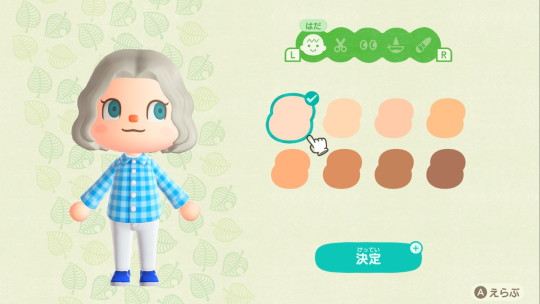
Here’s some basics for the character customization sheet in ACNH, for those who want to play this game in Japanese and might need some help.
みだしなみ 身だしなみ personal appearance
はだ skin
かみ 髪 hair (on the head)
め 目 eye
はな nose
くち 口 mouth
チーク cheek
えらぶ 選ぶ to choose, to select
けってい 決定 decision
I included some kanji, but most of the facial features were written in hiragana only, and all kanji in the game has furigana. It is a very good game for Japanese learners! Good luck!
なの
#acnh#animal crossing new horizons#animal crossing#japanese#japanese studyblr#japanese langblr#japanese vocab#japanese vocabulary#japanese vocab lists#animal crossing japanese#studyblr#langblr#doubutsu no mori
101 notes
·
View notes
Text
山高きが故に貴からず
やまたかきがゆえにたっとからず

人の値打ちは外見の立派さではなく、中身が大切だということのたとえ。
a mountain is not to be honoured just because it is high. It’s what inside that matters.
37 notes
·
View notes
Photo
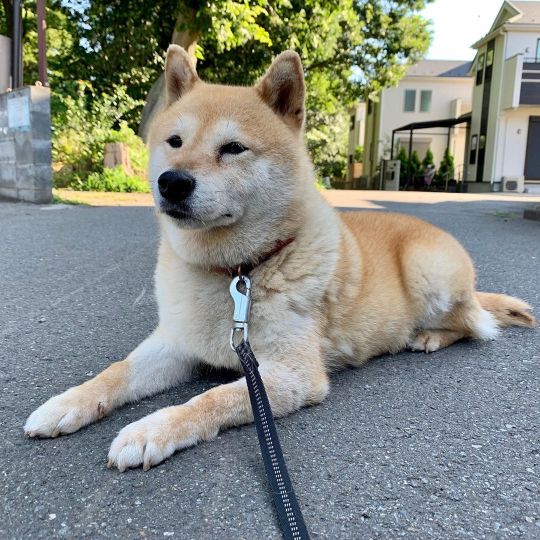
お腹空いちゃった。早くお家に帰ってご飯食べようよ🐶
#dog #doge #shiba #shibe #shibainu #shibastagram #komugi #柴犬 #赤柴 #しばいぬ #柴犬の小麦さん
https://www.instagram.com/p/CBg1rgYhNjU/?igshid=11t6b5b2ikwdq
30 notes
·
View notes
Photo
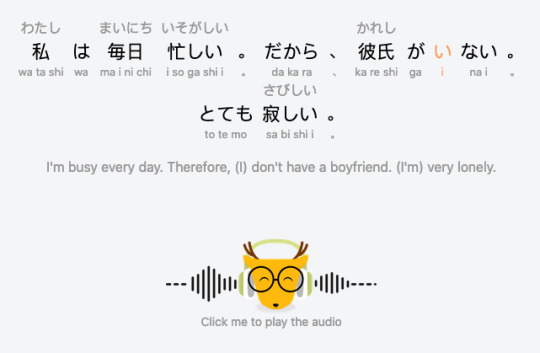
I feel attacked...
51 notes
·
View notes
Photo
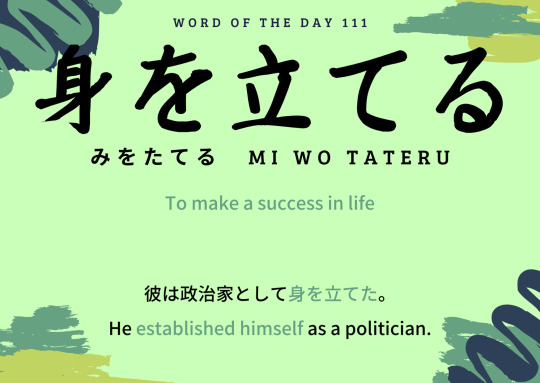
JLPT Level: Unlisted, but the kanji are Unlisted and N4 respectively.
…omg why isn’t 身 on the JLPT. IT’S SO COMMON lksdjfklsjf
Anyways.
身 means “somebody, person, one’s station in life.”
立てる means “to set up, to erect.”
So 身を立てる literally means to rise up, to stand up straight, and this leads to its figurative meaning of making something out of oneself.
103 notes
·
View notes
Text
湊かなえ『告白』
第一章 聖職者
愛美 「まなみ」 Manami
聖職者 「せいしょくしゃ」 clergyman, lit. a person of sacred profession (in context of this book refers to teachers)
実験台 「じっけんだい」 subject of an experiment, human guinea pig
真相 「しんそう」 truth, real situation
従事 「じゅうじ」 following (a profession), pursuing (studies, etc.)
余命 「よめい」 remainder of one’s life
思春期 「ししゅんき」 puberty
情緒不安定 「じょうちょふあんてい」emotional instability
親バカ 「おやばか」 doting parent
自己陶酔 「じことうすい」narcissism, self-intoxication
模範生 「もはんせい」 model student
猟奇的 「りょうきてき」 bizarre, grotesque
エイズ acquired immune deficiency syndrome; AIDS
感染者 「かんせんしゃ」 infected person
ドン引き 「どんびき」 backing away from someone (due to their words, actions, etc.)
陰性 「いんせい」 negative (reaction in patient, etc.)
断念 「だんねん」 giving up (hope, plans)
片田舎 「かたいなか」 remote countryside
シングルマザー single mother
人工呼吸 「じんこうこきゅう」 artificial respiration
告別式 「こくべつしき」funeral service
刑事罰 「けいじばつ」 criminal punishment
青酸カリ 「せいさんかり」 potassium cyanide
心神喪失 「しんしんそうしつ」 unsound mind
静電気 「せいでんき」 static electricity
感電 「かんでん」 receiving an electric shock
水死 「すいし」 death by drowning
不行届き 「ふゆきとどき」 negligence, carelessness
倫理観 「りんりかん」 ethics, sense of duty
『よく、やりたいことが見つからないと言い訳しながら、いい歳をして家でぐだぐだしている人がいますが、やりたいことがすぐに見つかり、それに従事できる人なんてごくわずかです。それなら、目の前にあることを精一杯こなしていけばいいのではないでしょうか。それは、やりたいことを見つけたときの自分にとって決してマイナスにはならないなずです。』
“Lots of people fritter away their lives complaining that they were never been able to find their true calling. But the truth is that most of us probably don’t even have one. So what’s wrong, then, with deciding on the thing that’s right in front of you and doing it wholeheartedly? That’s what I did, and I have no regrets.” (Translation by Stephen Snyder)
157 notes
·
View notes
Text
ハウルの動く城
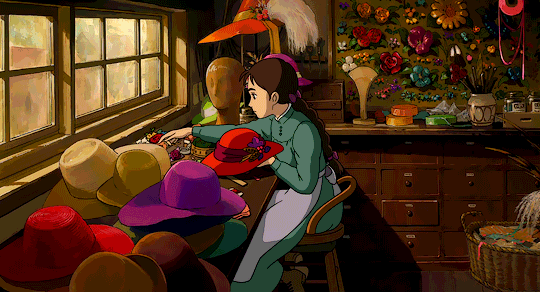
暖炉「だんろ」 fireplace, hearth, stove
荒地「あれち」 wasteland, abandoned land
弱虫「よわむし」 coward, weakling, wimp, sissy
魔力「まりょく」 magical powers, spell, charm
軍艦「ぐんかん」 warship, battleship
長女「ちょうじょ」 eldest daughter, first-born daughter
魔女「まじょ」 witch
決戦「けっせん」 decisive battle, deciding match, play-off
能弁「のうべん」 eloquence, oratory
山小屋「やまごや」 mountain hut
隠れ家「かくれが」 hiding place, hideout, retreat, hideaway
雨漏り「あまもり」 roof leak
肩掛け「かたかけ」 shawl
回し者「まわしもの」 spy, secret agent
心変わり「こころがわり」 change of heart, change of mind
中折れ「なかおれ」 felt hat, fedora; being interrupted or broken in the middle
帽子屋「ぼうしや」 hat shop, hatter, hatmaker
掃除婦「そうじふ」 cleaning woman
悪知恵「わるぢえ」 craft, cunning, guile, serpentine wisdom
我楽多「がらくた」 junk, rubbish, trash, garbage, odds and ends
魔方陣「まほうじん」 magic square
薄情者「はくじょうもの」 heartless, insensitive person
影武者「かげむしゃ」 body double
咳き込む「せきこむ」 to cough violently, to have a coughing fit
空襲警報「くうしゅうけいほう」 air-raid alarm
99 notes
·
View notes
Text
Random Japanese vocabulary
純情 [じゅんじょう] - pure heart, naivete, innocence
歯科衛生士 [しかえいせいし] - dental hygienist
歯石 [しせき] - calculus, tartar
揶揄う [からかう] - to ridicule, to tease, to mock, to make fun of, to poke fun at
些細 [ささい] - trivial, slight
胎盤 [たいばん] - placenta
保存 [ほぞん] - preservation, conservation, storage, maintenance
発達 [はったつ] - development, growth
肥料 [ひりょう] - manure, fertilizer
過酷 [かこく] - severe, harsh, hard, cruel, rigorous
洞穴 [ほらあな] - cave
ときめき - beating (of the heart, with joy, excitement, etc.), palpitation, throbbing, pounding, fluttering
ひたすら - intently, single-mindedly, devotedly, solely, earnestly, with all one’s heart
139 notes
·
View notes
Text
Japanese vocab concerning family and family relations:
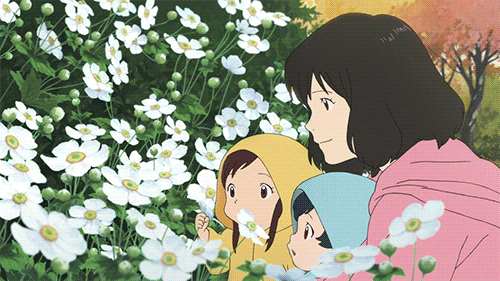
親戚・しんせき・shinseki “relative”, also 親類・しんるい・shinrui
家族・かぞく・kazoku “family”
実家・じっか・jikka “parent’s house” (meanings of individual kanji are “truth-house”, how sweet)
親孝行をする・おやこうこうをする・oyakoukou wo suru “to be good to one’s parents”, 孝 means “filial piety”, it can be found in a rather famous clip (and given the topic of the song, it fits)

祖先・そせん・sosen “ancestor” vs. 子孫・しそん・shison “descedant”
姉妹・しまい・shimai “sisters” vs. 兄弟・きょうだい・kyoudai “brothers” or “sibilings”
継母・けいぼ・keibo “stepmother” vs. 継父・けいふ・keifu “stepfather”
義姉・ぎし・gishi “sister-in-law” (older than you) vs. 義兄・ぎけい・gikei “brother-in-law” (older than you), also they can be read as義姉・あね・ane and 義兄・あに・ani
102 notes
·
View notes
Text
Japanese lesson 35
Today's theme is "No way".
今日のテーマは「ありえない, まさか」です。
(きょうのてーまは ありえない まさか です)
①A: I just won a million dollars in the lottery!
宝くじで100万ドル当たったんだ!
(たからくじで ひゃくまんどる あたったんだ)
B: Really? No way!
マジ? ありえない!
② A: My car was stolen.
車盗まれた。
(くるま ぬすまれた)
B: No way! Your kidding,right?
まさか! 冗談でしょ?
(まさか じょうだんでしょ)
You should use it!
See you again!!
96 notes
·
View notes